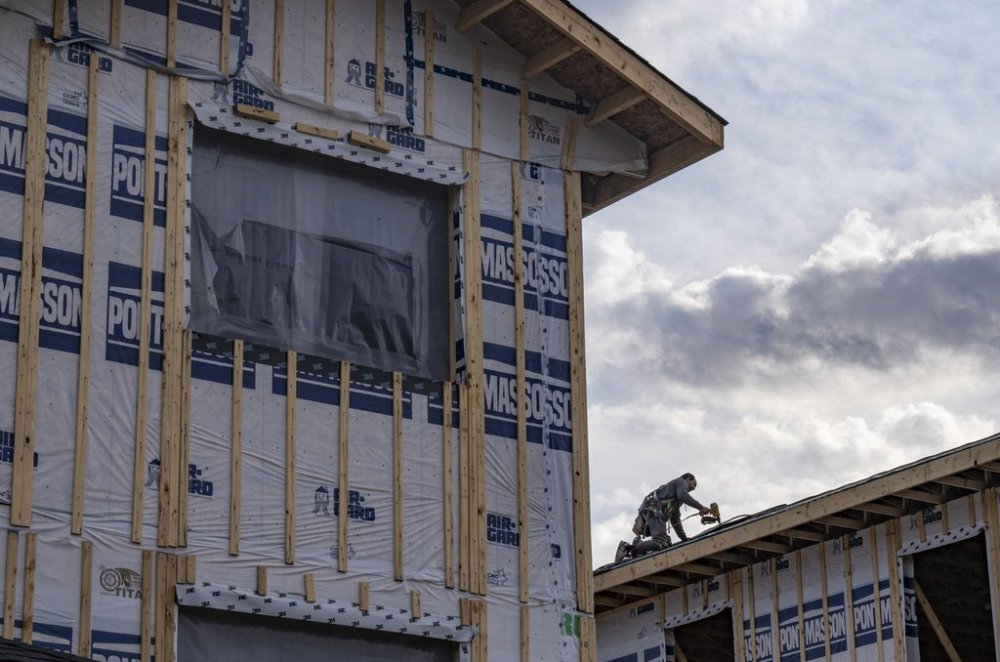CMHC reports annual pace of housing starts dropped 17 per cent in October
Advertisement
Read this article for free:
or
Already have an account? Log in here »
To continue reading, please subscribe:
Monthly Digital Subscription
$0 for the first 4 weeks*
- Enjoy unlimited reading on winnipegfreepress.com
- Read the E-Edition, our digital replica newspaper
- Access News Break, our award-winning app
- Play interactive puzzles
*No charge for 4 weeks then price increases to the regular rate of $19.00 plus GST every four weeks. Offer available to new and qualified returning subscribers only. Cancel any time.
Monthly Digital Subscription
$4.75/week*
- Enjoy unlimited reading on winnipegfreepress.com
- Read the E-Edition, our digital replica newspaper
- Access News Break, our award-winning app
- Play interactive puzzles
*Billed as $19 plus GST every four weeks. Cancel any time.
To continue reading, please subscribe:
Add Free Press access to your Brandon Sun subscription for only an additional
$1 for the first 4 weeks*
*Your next subscription payment will increase by $1.00 and you will be charged $16.99 plus GST for four weeks. After four weeks, your payment will increase to $23.99 plus GST every four weeks.
Read unlimited articles for free today:
or
Already have an account? Log in here »
Canada Mortgage and Housing Corp. says the annual pace of housing starts in October fell 17 per cent compared with September.
The national housing agency said the seasonally adjusted annual rate of housing starts was 232,765 units in October, down from 279,174 in September.
The drop came as the number of starts in Ontario and British Columbia fell in October, said CMHC deputy chief economist Tania Bourassa-Ochoa.

However, she noted that higher starts in markets like Montreal, Calgary, and Edmonton helped keep the national year-to-date total elevated compared with the same period last year.
“While these results are generally reflective of investment decisions made months or even years ago, they also highlight persistent and significant regional contrasts in housing construction trends across the country,” said Bourassa-Ochoa in a press release.
Actual housing starts in centres with a population of 10,000 or greater were down three per cent year-over-year, totalling 19,174 units, compared with 19,763 in October 2024.
When looking at Canada’s big three cities, Montreal posted a 104 per cent year-over-year increase in actual housing starts, which the agency said was driven by significantly higher multi-unit starts.
There were 36 per cent fewer starts in Vancouver due to fewer multi-unit starts, while Toronto declined 42 per cent with both multi-unit and single-detached starts lower than last year.
The year-to-date total for centres with a population of 10,000 or greater was 197,207, up from 188,660 in the same period in 2024.
“It’s no surprise to see starts fall in Vancouver and Toronto, where developers have next to no interest in building condos, and little room to build anything else. But starts in non-urban areas are trending down as well,” Clay Jarvis, a mortgage expert at NerdWallet, said in a note.
“In the wake of the recently released federal budget, with its high hopes around housing development, today’s starts data is an important reminder of just how difficult it is to get new projects off the ground.”
The Liberal government’s 2025 budget tabled Nov. 4 pledged to spend $25 billion on housing over the next five years. It called attention to CMHC’s estimate that 430,000 to 480,000 new housing units are needed per year in the next decade in order to restore affordability to 2019 levels.
That would represent around double the current pace of home construction across the country.
The six-month moving average of the seasonally adjusted annual rate of total housing starts was 268,907 in October, down from 277,081 in September.
TD economist Rishi Sondhi said that despite the dip in October housing starts, homebuilders are still starting new units “at a fairly healthy clip,” supported by the purpose-built rental market.
“Notably, homebuilding in the rest of Canada is much stronger than in Ontario, as the latter is being weighed down by a retrenchment in condo construction,” he said in a note.
“Looking ahead, the softening trend in building permits suggests some further downside for starts in the near-term. This is consistent with our view that homebuilding is likely to cool next year, as modest population growth weighs on rents, and weak pre-sales activity restrains starts in the ownership market.”
This report by The Canadian Press was first published Nov. 18, 2025.

